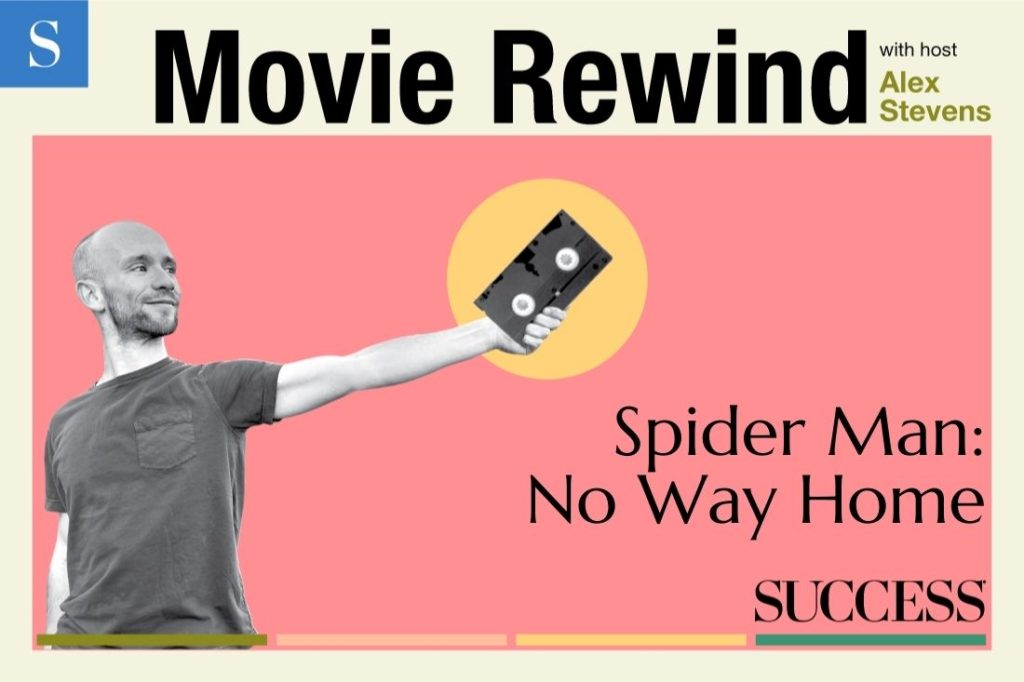I recently had the distinct pleasure of returning to the movie theater for the first time since the quarantines and lockdowns began. I have a projector at home, so I haven’t been starved for cinema, but I realized just how much I had missed the shared experience of watching a movie in the theater — all of us watching the same thing, all of us leaving with different experiences.
It helped that the movie I saw was packed with things to discuss and think about. It was Spider-Man: No Way Home. Honestly, it’s one of the best movies I’ve seen in a long time.
This is SUCCESS Movie Rewind, the once-weekly, spoiler-free-within-reason movie discussion podcast that combs through the world of film for nuggets of wisdom that can help you level up in business and life. You don’t have to have seen the film we’re discussing, and you don’t have to go watch it afterward—though I think you’ll want to.
With that, let’s sort through the web of lessons I took away from the most recent entry in the Spider-Man saga.
Lesson 1: Just Start
Tom Holland’s Spider-Man kicks off this film by meddling with the magic of alternate universes—called “Spider-Verses” in Marvel canon—with the help of Dr. Strange. He’s trying to undo the global revelation that he is Spider-Man so he can return to some sense of equilibrium.
The result of casting a spell to change the fabric of space and time, as you might guess, is that it doesn’t go well.
This is a human story, one of a very few told in books and films. As one of my favorite writers, Kurt Vonnegut, would see it: Spider-Man finds himself struggling to return to a state of equilibrium, an equilibrium he had and then lost. That is the central struggle of this plot.
How does our hero tackle this enormous problem of space, time and lots of villains? By just starting.
That’s the takeaway for those of us who have entrepreneurial goals or big growth plans. You have to start—you can’t get bogged down in the what-ifs and the old versions of yourself. You have to look forward and hope you have people you can lean on as you push through, as Spider-Man always seems to have.
Spider-Man realizes in this film that his fight to return the world to normal could put his loved ones at risk. He has to reckon with just how much risk he’s willing to put on them, but in the end, he has superpowers, and as he knows well, superpowers come with great responsibility.
He has a responsibility to take action, no matter the personal risk. I think we all have a responsibility to act, to use our own superpowers to make the world the way we believe it should be.
In her most recent book, Atlas of the Heart, Brené Brown refers to the ability to be hypersensitive and thoroughly process and communicate emotion as a superpower. And it is—it’s a superpower that Brown and Spider-Man share and use to better the world. Facing the seemingly impossible task of changing the world, Spider-Man and Brown had to start somewhere. You do, too.
Lesson 2: Stand in Your Spiral
Somewhere between the moment you start and the moment you succeed, you will have chaos—a dark night of the soul when you are unsure whether all of this work will be worth it—and you may forget why you started this journey in the first place. When that happens, you have to stand in your spiral.
I realize that calls for a little context. On Spider-Man’s journey to undo the chaos that comes from the smashing together of various dimensions, he finds himself in the Mirror Dimension, where everything is upside-down. There, he draws on his considerable mathematics prowess to recognize an Archimedean spiral. I won’t get into too many complex geometry concepts or spoilers here, but the point is that Peter Parker realizes that there is some order within this chaotic spiral, and that it’s his way home.
OK, back to your journey. You will encounter your own spiral when things start to go south. And you have to stand in it to see clearly what needs to change. Peter does this in the movie, and he gets back to his roots as a scholar and a mathlete. To see what might be wrong, assess whether a 180 is in order or understand what you need to tweak, you have to get back to what you’re good at, what set you out on this journey in the first place. Embrace the chaos when things are going wrong to see yourself through to the next phase.
Lesson 3: Do the Math, but Don’t Forget the Magic
You need to be like Spider-Man and do the math when it counts, but when you’re doing that, don’t forget the magic. Math is great, a solid concept we can rely on and use. Magic is myth, a fantasy or, at the very least, an unconfirmed phenomenon.
But within the confines of the Marvel Cinematic Universe, magic sometimes becomes math. Peter Parker himself talks about Thor, a key character in the MCU who, at a point not long ago, was nothing more than a mythological Norse god. At the point at which No Way Home is set, however, he’s in science textbooks.
The math you know today—the stuff that adds a layer of realism to your creative dreams—is grounding. But it can also be crushing if you forget the beautiful reality you have envisioned for yourself and your company. Trust your vision, have faith in your skills, definitely do the math, but remember the magic. Think of your dream like a sculpture, and the current real-life state of it like a block of marble. You just have to do the math required to chip away the pieces that aren’t the sculpture you have envisioned. That’s how you make your math into magic.
Spider-Man finds himself chipping away the pieces of a new reality, one he set into motion but did not ask for. He works hard because he remembers why he wanted this in the first place. He keeps going until he’s chipped away the pieces that aren’t working. We can all learn from that.
Next Up for SUCCESS Movie Rewind
We’ve got a discussion of the new Dune on the horizon, and I’m really excited about that. But next week, we’re putting the “rewind” in SUCCESS Movie Rewind and taking it all the way back to Back to the Future. I hope to see you back here in the future.











